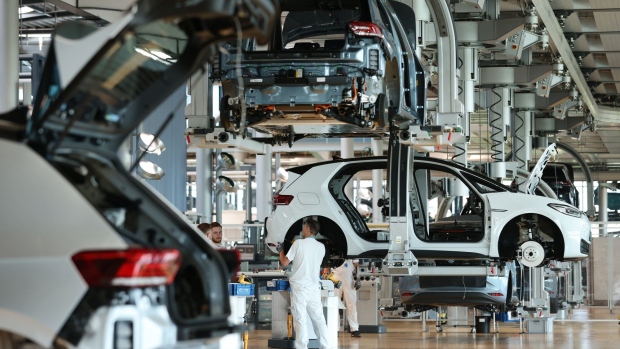Sep 26, 2023
Volkswagen Cuts EV Production at German Sites as Demand Craters
, Bloomberg News

(Bloomberg) -- Volkswagen AG is curbing the production of electric vehicle models at two German plants due to declining European demand and shrinking government subsidies.
Production of Volkswagen’s ID.3 and Cupra’s Born electric models will be dialed back at the German carmaker’s main EV factory in Zwickau until Oct. 16, a spokesperson said. Assembly of the ID.3 at a small-scale plant in Dresden will cease for the first two weeks of October.
VW is holding talks with local labor representatives on how production in Zwickau, located near the Czech border, will continue in the second half of October, the spokesperson said. Assembly in Dresden’s Glaeserne Manufaktur will return to normal during that period.
The appetite for EVs in Europe has been held back in recent months by higher energy, living and borrowing costs, as well as lingering consumer concerns about charging infrastructure and battery range. The German government’s decision to end subsidies for electric cars in company fleets this month led to a 171% increase in new EV registrations in August compared to the previous year, according to Germany’s VDA auto lobby.
Against that backdrop, Germany has led a months-long crusade to extend the use of internal combustion engines under the European Union’s climate plans through the use of so-called e-fuels.
Read more: EU Set to Propose Rules to Allow Germany E-Fuels for Cars
VW said earlier this month it was letting go 269 temporary workers in Zwickau whose year-long contracts are expiring soon. Orders for company cars, which accounted for some 70% of VW-branded EVs made in Zwickau, have been dropping in the wake of the subsidy phase-out.
(Updates with details on Dresden production in third paragraph. A previous version of this story was corrected to reflect production cut details in the second paragraph.)
©2023 Bloomberg L.P.


